Herpes- Viral diseases quite often attack a person and a weakened body. We often do not notice the presence of neighbors in the body ourselves, but viruses, meanwhile, can calmly stay in cells for years without manifesting themselves in any way. And then, with a decline in immunity, we are surprised to find herpes on the lips or, for example, herpes on the hand.
This discovery is not a disaster, most people are infected carriers, and the first signs of herpes may not manifest themselves at all.
But if you still have symptoms such as:
- Fatigue, for no reason;
- Rash on the body;
- Bumps on the body with fluid;
- Rash on the genitals and lips;
- Eye damage, conjunctivitis;
- Rash on the face and acne ;
- Neuralgic, acute pain due to hypothermia;
- Panic attacks, stress and irritation;
- Osteochondrosis and problems with the musculoskeletal system;
- Pain in the back, hips, and buttocks;
These symptoms are a reason to see a doctor.
What is herpes Infection?
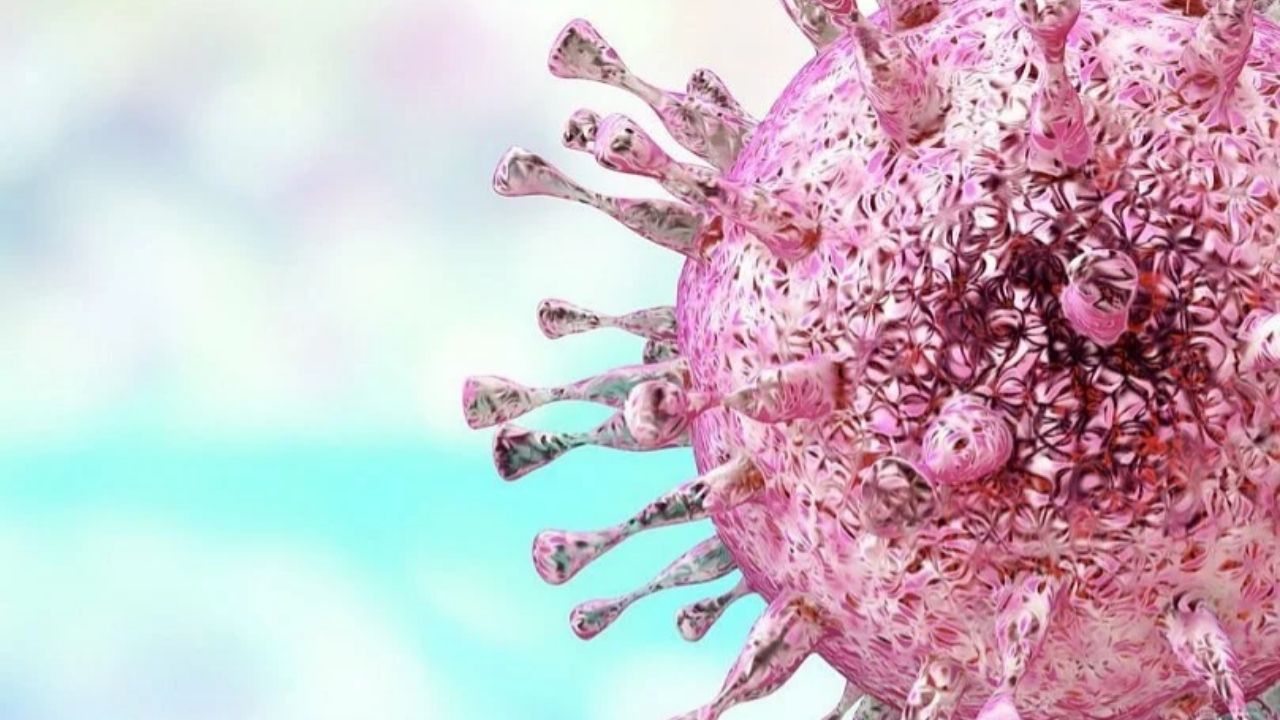
It is a latent virus that can worsen the quality of life of any person, in the absence of proper treatment and prevention. No one is immune from this disease. There is herpes on the body, herpes on the skin, subcutaneous herpes, which affects the internal organs and lives in the nerve ganglia. This family of viruses affects the central nervous system and is often very difficult to diagnose at an early stage. May worsen encephalitis and meningitis.
It is extremely unreasonable to ignore and miss out on timely treatment and prevention of herpes virus infection. Since even though the herpes virus and representatives of this family are extremely rare, they can cause irreparable harm to the entire body, irrevocably destroy nerve cells. This will lead to diseases of the nervous system and a deterioration in the quality of life and psycho-emotional state.
Types of herpes
The human body is affected by the symptoms of herpes of various types; in total, 8 types are known to medicine. Each of which is an independent disease, differing in external signs and has various reasons for the appearance of herpes, as well as the consequences of which infection with one type or another leads. Starting with the most famous and widespread type, below we will consider each type of virus separately.
Herpes simplex type 1
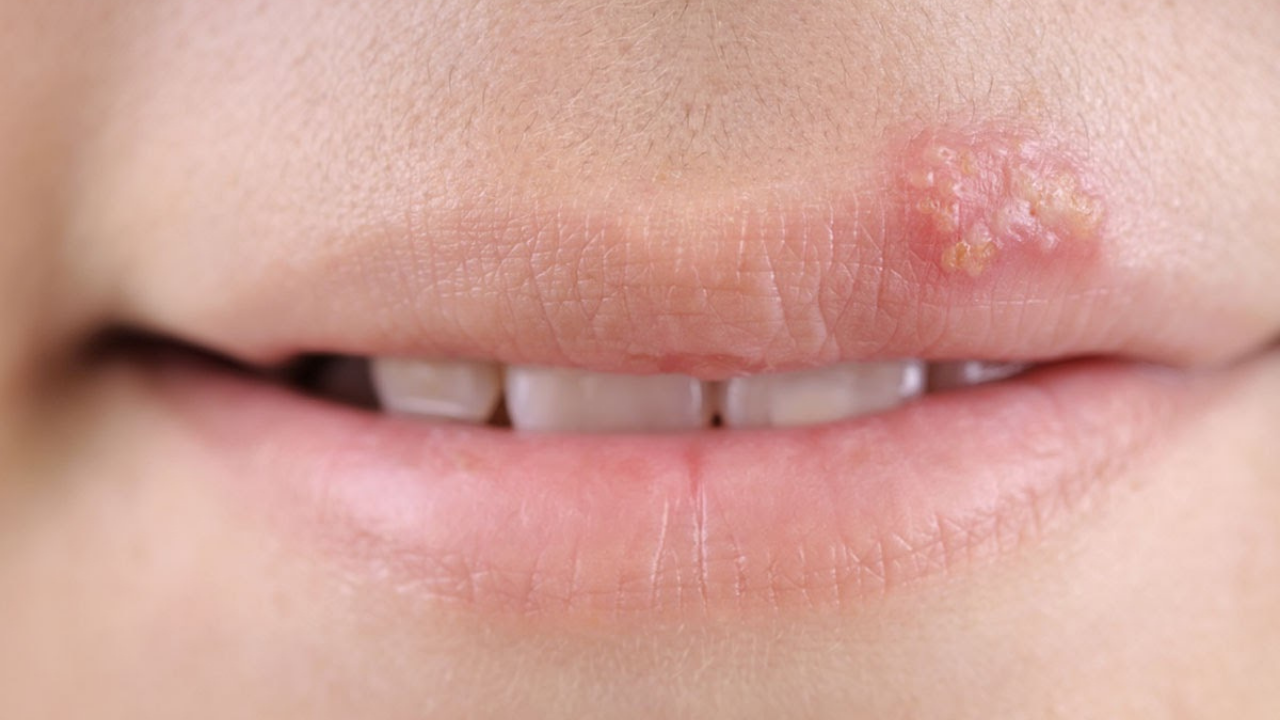
It is a common disease that affects 50 to 70% of the world’s population. The figure for fixing the Human alphaherpesvirus disease is 57.7%, the rest of the data is only approximate, since many adults may not even detect this type of herpes virus in themselves. It was discovered in 1912 by the scientist Grüter.
The main symptoms include pimpled rashes on the lips and around the mouth, sometimes affecting the nasal mucosa. Oral herpes is transmitted by contact, through saliva, kissing, sharing the same drinking container, contact with the vagina and through the placenta of the mother to the child.
Herpes simplex type 2, genital
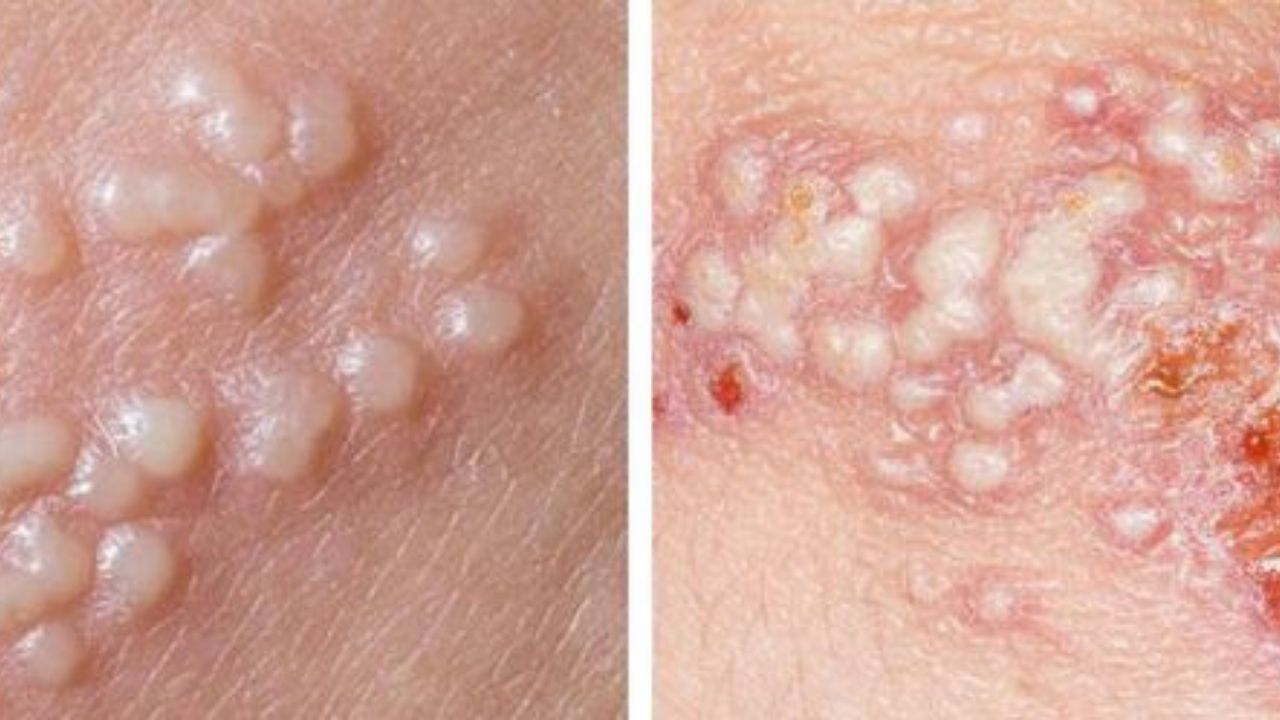
When directly infected, it affects the nervous system, which is why herpes appears in the same place. Dangerous for carriers of HIV infection, but despite this it is widespread. Adults over 50 years of age are carriers of genital herpes in 60% of cases. More often it manifests itself asymptomatically, but in the event of an exacerbation, a rash, vesicles with a virus-containing liquid, ulcers affecting individual parts of the body appear. Some symptoms also include acute pain in the pelvic organs, hip joints, buttocks, and legs.
Herpes zoster
In other words, in the common people, chickenpox or chickenpox, also known as herpes type 3 and shingles. Diagnosis of herpes of the third type is not easy, it is necessary to undergo a series of tests confirming the presence of the virus, but anyone who has ever had chickenpox in childhood is a carrier of it.
What herpes varicella-zoster looks like is shown in the picture below.
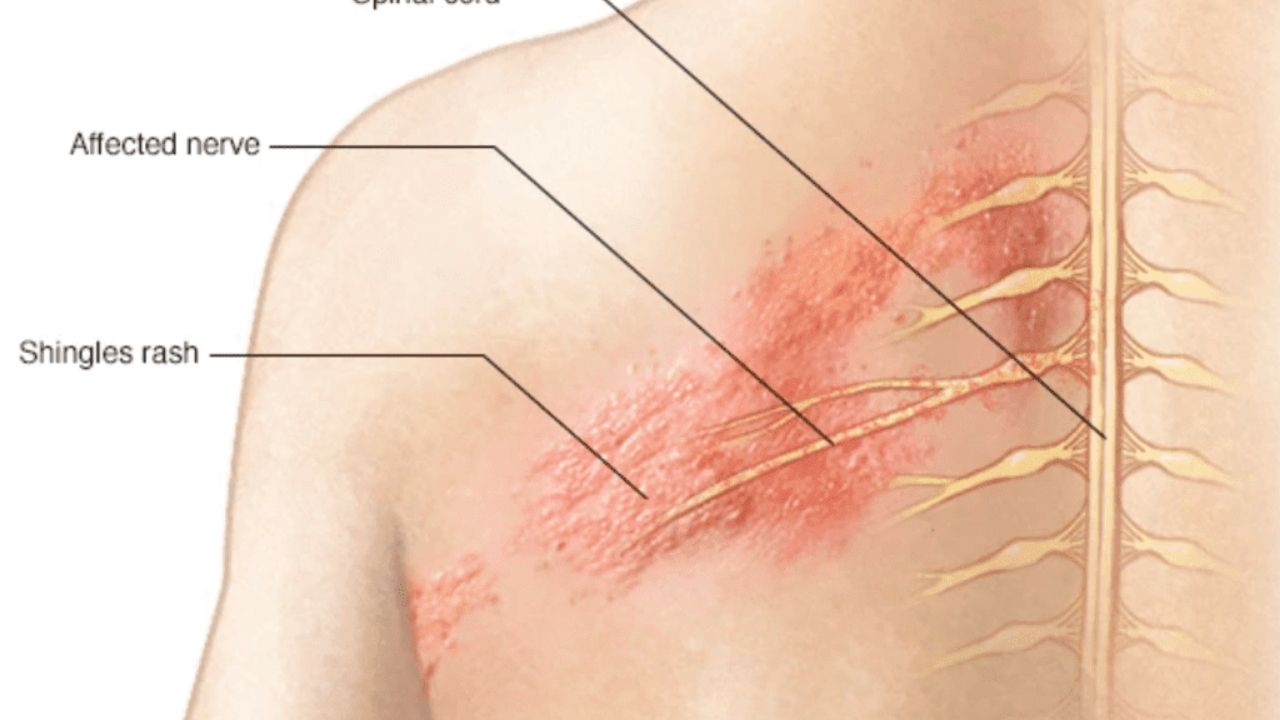
In childhood, chickenpox looks a little different, manifesting itself in the form of bubbles with the virus all over the body, as well as fever with fever and itching of the affected areas. More often, chickenpox at an early age passes with the least complications and is a completely harmless disease that most young children are susceptible to. It is much worse to have chickenpox in adulthood, where antiviral therapy and possible hospitalization of the patient are urgently required.
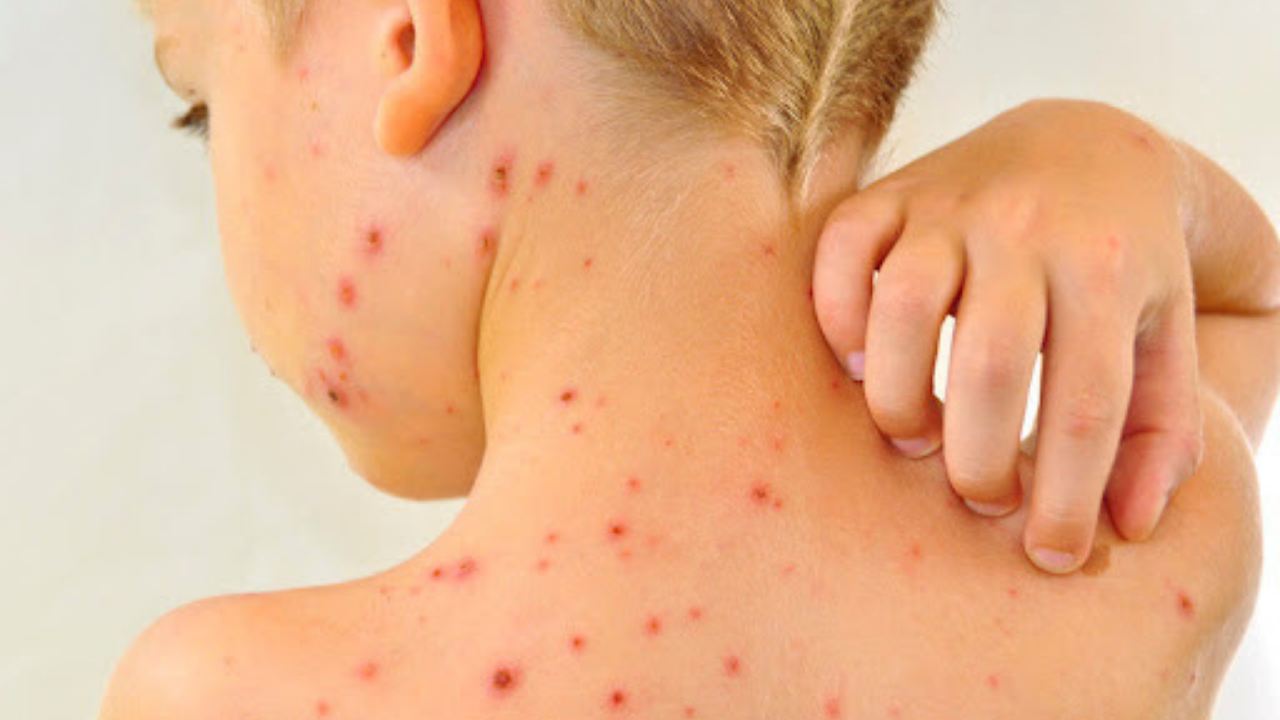
Epstein-Barr virus
This is the 4th type of herpes, dangerous and affecting the human body. One of the most common types, it is more often asymptomatic and affects more than 80% of the adult population. Diagnosis requires testing, treatment and vaccination at the development stage. Unlike its predecessors, this virus does not kill a cell, but, on the contrary, causes cell growth and tumor lesions in the body.
Cytomegalovirus
Herpes simplex virus type 5 is the least contagious, but no less dangerous. Transmitted:
- Through saliva;
- From mother to fetus and during lactation through milk;
- Sexual contact;
- Sexually.
It is more likely herpes of internal organs, since the main manifestation is a lesion of the inflammatory nature of the genitourinary system, liver, kidneys, and also the infection manifests itself in the form of ARVI. But with good immunity, it may not manifest itself at all. In the absence of timely treatment and a decrease in the manifestation of symptoms with a further strengthening of immunity, it can lead to the development of oncology. And many other complications.
All other types of herpes, as well as the human papillomavirus, are not fully understood, but more often manifest themselves in the form of a rash, chronic fatigue syndrome and a noticeable deterioration in the patient’s emotional state. It is very important, in addition to treating the herpes itself, to improve and increase the general state of the body’s immune system to produce the required amount of antibodies and the ability of immunity to independently fight the virus and resist infection.
Treatment and prevention
A dermatologist , virologist and immunologist and just a therapist are the necessary specialists working with patients carrying herpesovirus. Diagnostics takes place with visual inspection, analysis for stickiness or abbr. TORCH is a general analysis for diseases such as toxoplasmosis, syphilis, candidiasis, rubella, cytomegalovirus, herpesvirus types 1 and 2. They look for these infections and carry out a general blood test for herpes, to exclude other concomitant diseases and the possible aggravation of their course.
After establishing the diagnosis, you need to understand that this disease is completely incurable, internal herpes affects directly at the cellular level and sits deep in the nerve cells of the body. You do not need to independently prescribe medication for yourself, self-medicate and neglect consultation with a specialist. The drugs used in the treatment of herpes include:
- Interferon inducers;
- Acyclovir;
- Valacyclovir;
- Famciclovir;
- Doconazole;
- Vitagerpavak;
- Thromatadine.
A more complete list of drugs with their analogues can be obtained from your doctor. The discovery of the main drug, Acyclovir by Schaeffer, was awarded the Nobel Prize, and since 1979 to this day, this drug has been successfully used in the reduction of symptoms and the treatment of herpes. How long therapy lasts and how soon the results will be depends on the individual characteristics of the patient.
Conclusions
From the above, we learned how this malicious virus manifests itself, which organs and parts of the body it affects, how to treat herpes on the body and in the cells of the nervous system. It is very important to start treatment in a timely manner and not engage in self-diagnosis and self-medication. The drugs used for herpes infection are effective when prescribed by a doctor in the individual dosage required in a particular case.
To protect yourself from contracting herpes virus, you need to follow basic rules of hygiene and safety, such as protected sexual contact, minimize bodily contact with sick or unfamiliar people, do not kiss or have sexual intercourse during an exacerbation of herpes with a partner, and just wash your hands more often and observe personal hygiene.